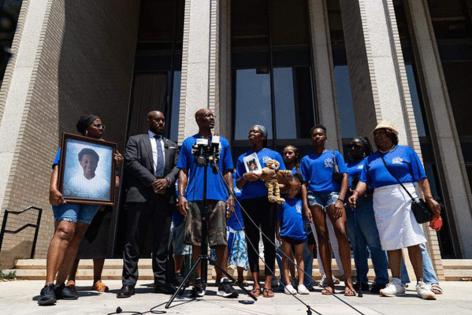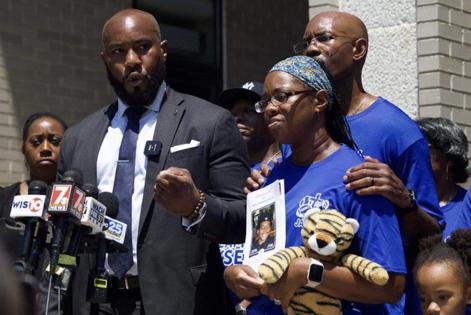Why the family of 12-year-old S.C. amoeba victim wants an investigation
Published in News & Features
Clarence and Ebony Carr are seeking answers about the death of their son.
Jaysen Carr, a 12-year-old student at Hand Middle School in Columbia, South Carolina, died on July 18 from a rare infection of the Naegleria fowleri amoeba, which health officials say likely came from Lake Murray. His family hired attorney Tyler Bailey to lead an independent investigation of Jaysen’s death.
Carr’s identity and the investigation were announced on July 24, and on Tuesday, Bailey appeared alongside the Carr family and supporters outside of the South Carolina Department of Environmental Services building on Bull Street to discuss the investigation with media. There, Bailey, who also serves as a member of Columbia City Council, called for changes in how state agencies track and report the amount of the amoebas in waterways and how they respond to cases of infection.
“This is a very tough situation. We’re doing the best we can,” Jaysen’s father, Clarence, said Tuesday. “We do not want this to happen to anyone else.”
Naegleria fowleri, sometimes called the brain-eating amoeba, is not a reportable disease in South Carolina, meaning cases that occur within the state are not required to be reported to health officials. The state public health department does not track cases of infections from the amoeba, according to a statement from the department. Bailey asks that legislation be passed to add infection from Naegleria fowleri to the list of reportable diseases, he said.
According to Bailey, no state agencies asked the family for information on Jaysen’s activities that day or followed up with tests.
“There was never any testing of the water. There’s no questioning of where Jaysen was swimming and playing in the water,” Bailey said. “That’s the whole purpose of the independent investigation, because we’re doing the work that the agencies should have done.”
Bailey and the Carr family are still working to figure out where Jaysen was in the lake, but that should have been the work of a public agency, the attorney said.
Bailey said during times of high temperature and low water levels, conditions which increase the risk of amoeba infection, Dominion Energy or state agencies should send out advisories for Naegleria fowleri the same way heat advisories are sent out. The attorney added that those advisories could inform the public about the increased risk and methods to reduce it, such as making sure children cover their noses, and that signs could also be placed in common swimming areas with information about the amoeba.
“Just a short advisory like that would go a long way,” Bailey said.
Bailey compared what should be done with Naegleria fowleri to how the state Department of Environmental Services tests beaches. The department tests over 120 beaches for harmful bacteria, sending out advisories if the levels come back high.
In an emailed statement to The State, the department of environmental services said that there is no “science-based threshold” for safe or unsafe levels of Naegleria fowleri like there is for bacteria, and there are no federal or state standards for the matter. The agency added that neither the Centers for Disease Control and Prevention nor the Environmental Protection Agency recommend routine sampling for the amoeba.
“We’re not aware of any states that perform routine sampling of ambient water for this amoeba,” the department said in the statement.
The state Department of Public Health said it became aware of a case of Naegleria fowleri the week of July 7. After confirming the infection the morning of July 22, the department clarified that the case came from the Midlands, and later that evening, it announced that it presumed the infection had come from Lake Murray. Prisma Health confirmed that a patient in its Midlands children’s hospital died from the amoeba.
Health officials said Lake Murray does not have a higher risk of infection compared to any other body of fresh water. The amoeba is very common across fresh waterways in South Carolina, but infections are quite rare, requiring the amoeba to enter the nose at the right time and with enough water pressure behind it, said Dr. Anna-Kathryn Burch at Prisma Health Children’s Hospital in the Midlands.
Jaysen’s case was the first reported in South Carolina since 2016, according to the health department. Across the nation, only 167 cases have been reported in the last 62 years. The rarity of infection should not stop potential changes that could prevent more cases, Bailey said.
“They can say it’s rare, but to the Carrs, it’s not rare,” Bailey said. “They lost their son, and nothing’s gonna bring him back.”
Burch recommended avoiding fresh water activities when temperatures are high and water levels low, conditions which concentrate the amoebas in the water. Naegleria fowleri lives in the sediment at the bottom of bodies of water, and disturbing the material at the bottom can further suspend amoebas in the water, Burch added.
“We shouldn’t be afraid to be in lakes and rivers and those kinds of things,” Burch said. “It’s a big part of what South Carolinians do. I just think you need to be safe when you go into those bodies of water.”
According to a press release from the Bailey Law Firm, Jaysen was an honor student, played flute in the school band and enjoyed a variety of sports. It was only after Jaysen died that his parents discovered that he took part in a school program to help students with special needs, Clarence said Tuesday.
A GoFundMe for his family had raised over $50,000 as of July 29.
Jaysen’s father, Clarence, will throw a ceremonial first pitch at Segra Park Wednesday, where the Columbia Fireflies are holding a “Team Jaysen Night” fundraiser, according to an X post from Dreher High School’s athletics program.
_____
©2025 The State. Visit thestate.com. Distributed by Tribune Content Agency, LLC.










Comments